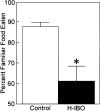Anterograde amnesia and temporally graded retrograde amnesia for a nonspatial memory task after lesions of hippocampus and subiculum
- PMID: 12040072
- PMCID: PMC6758809
- DOI: 10.1523/JNEUROSCI.22-11-04663.2002
Anterograde amnesia and temporally graded retrograde amnesia for a nonspatial memory task after lesions of hippocampus and subiculum
Abstract
We studied the importance of the hippocampus and subiculum for anterograde and retrograde memory in the rat using social transmission of food preference, a nonspatial memory task. Experiment 1 asked how long an acquired food preference could be remembered. In experiment 2, we determined the anterograde amnesic effects of large lesions of the hippocampus that included the subiculum. In experiment 3, large lesions of the hippocampus that included the subiculum were made 1, 10, or 30 d after learning to determine the nature and extent of retrograde amnesia. Normal rats exhibited memory of the acquired food preference for at least 3 months after learning. Hippocampal lesions that included the subiculum produced marked anterograde amnesia and a 1-30 d temporally graded retrograde amnesia. The results show the importance of the hippocampus and related structures for nonspatial memory and also demonstrate the temporary role of these structures in long-term memory.
Figures





References
-
- Anagnostaras SG, Gale GD, Fanselow MS. Hippocampus and contextual fear conditioning: recent controversies and advances. Hippocampus. 2001;11:8–17. - PubMed
-
- Bunsey M, Eichenbaum H. Selective damage to the hippocampal region blocks long-term retention of a natural and nonspatial stimulus-stimulus association. Hippocampus. 1995;5:546–556. - PubMed
Publication types
MeSH terms
Substances
Grants and funding
LinkOut - more resources
Full Text Sources
Other Literature Sources
Medical
